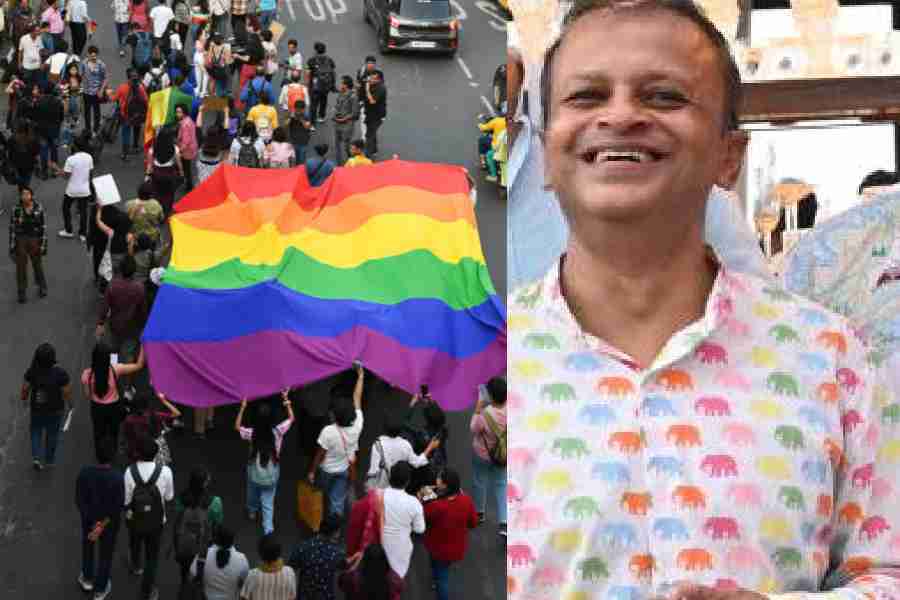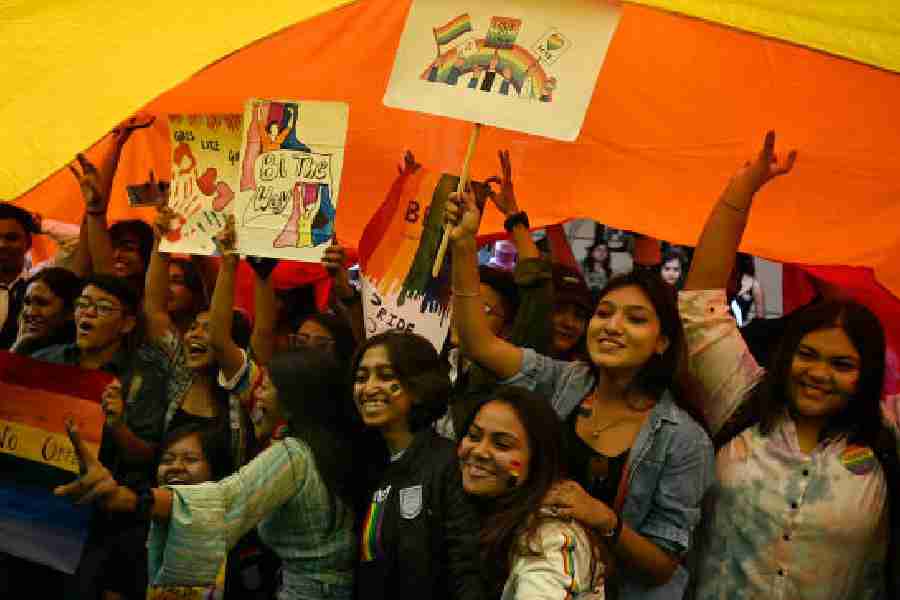Park Street has a new selfie spot these days — the rainbow flag outside the iconic Trincas restaurant. It’s not just an LGBTQ+ Pride flag. Trincas has started Pink Social Thursdays at the tavern as a queer-friendly karaoke and adda place for those who like their nightlife a little low-key.
One Thursday I listened to a young man gamely do stand-up about his Bumble dating encounters, someone sang Bob Dylan while someone else brought down the house with Piya tu ab toh aaja. It was standing room only. A friend said it reminded him of Christopher Street in New York in the heyday of the gay ballroom scene. That was the African-American and Latino underground queer subculture made famous in the documentary Paris is Burning. That in turn inspired RuPaul’s Drag Race, Madonna’s Vogue and Ryan Murphy’s Pose, all of which took the subculture mainstream.
That ballroom scene wasn’t just about fabulous costumes and voguing. It was a response to racism in drag queen pageants, which mostly had white judges. It was also about creating “houses” with names like the Royal House of LaBeija or The House of Aviance. The houses were led by “mothers” and “fathers”, often drag queens providing a chosen family to those who didn’t feel at home with their own families.
LGBTQ+ narratives, whether in New York or Calcutta, have often been about letters of the alphabet looking for a home. With Section 377 criminalising queer lives, many assumed that home could not be a place like Calcutta. I know gay Indians who used the very existence of Section 377 as a basis for an asylum claim in the West. Yet it was this Calcutta that saw the first Pride March in India in June 1999, though it was called Friendship Walk.
June is when the world commemorates the Stonewall Inn uprising in New York in 1969 when drag queens, lesbians, homeless youth all fed up with police harassment struck back chanting “we want freedom”. Stonewall Inn is now a national monument in the US.
Activist Owais Khan, one of those original Friendship Walk participants, said he wanted to celebrate “Gay Liberation Day” with at least a “small pada yatra with pink triangles and rainbow-coloured peacocks”. The Friendship Walk was meant to happen in different cities across India but the furore over Deepa Mehta’s lesbian film Fire scuttled all those plans. Calcutta was the one city that didn’t see Fire protests. So it ended up hosting the Friendship Walk. About 15 people showed up in bright yellow T-shirts in the pouring monsoon rain.
Pawan Dhall, founder of the local gay support group Counsel Club, remembered walking into the state’s Human Rights Commission office. The junior official who met them was “completely surprised about what this issue was. What is lesbian, what is gay, what is bisexual?”
We have come a long way since then. Transwomen appear on reality shows like Zee Bangla’s Didi No. 1 to talk about both their businesses and their transition journeys. Former chief minister Buddhadeb Bhattacharjee’s daughter has decided to become a trans-man named Suchetan. Entering the Maze, a translation of the queer fiction of Krishnagopal Mallick by Niladri Chatterjee reveals a queer Calcutta that blithely thrived right in our backyard in the 90s and didn’t need to take its cues from the West. A queer panel at a literary festival is nothing extraordinary any more. After Section 377 was reinstated by the Supreme Court in 2013, Vikram Seth took to the stage of the 2014 Kolkata Literary Meet and read a poem he had just written which ended with the lines:
To sneer at love, and wrench apart
The bonds of body, mind and heart
With specious reason and no rhyme:
This is the true unnatural crime.
That he recited it in the shadow of the Victoria Memorial, a marble edifice to the woman who gave us the corset of Victorian morality, felt especially fitting. As Malavika Banerjee, the director of the literary meet said, it was a way to “reclaim and reimagine ‘’ what the Victoria Memorial stood for.
Of course, there is a long way to go. A local queer researcher and activist was beaten and drummed out of their home by their own brother recently. An out gay man who was a regular at parties and openly in a relationship with another man suddenly got married to a woman. Now his Instagram feed is awash with glossy Jamai Shashthi reels and everyone pretends that the past never existed.
Meanwhile, LGBTQ+ Indians who had moved to places like the United States found themselves stranded in the very white bar cultures of cities like New York and San Francisco. Arvind Kumar co-founded Trikone, a South Asian LGBT support group and newsletter. Arvind was a good old-fashioned desi trope — the IIT-educated engineer with a US post-graduate degree working in Silicon Valley. He said he founded Trikone because wherever he went he felt he had to check one identity at the door, gay at the bar, Indian at the Diwali potluck. He just wanted to be both at the same time.
He and his partner Ashok Jethanandani opened their home to scores of people like them. When I went to their house in San Jose, as a newly arrived engineer in Silicon Valley, I too felt I had come home. There was dal on the stove, a carefully nurtured curry patta plant in a pot, the familiar smell of mustard seed tadka, and always a place to crash. Like the “houses” of Paris is Burning this too was about creating a home and a chosen family. The joke was whenever we started dating anyone, it was not serious until we brought that person “home” to meet Arvind and Ashok.
Meanwhile, in the world outside, geography grouped us with Asians but we felt like strangers in bars that catered to people from China, Vietnam and the Philippines. We looked more like the clientele at the Latino bars until someone spoke to us in Spanish. The fledgling dating sites did not even have a box for our ethnicity. South Asians fell throughout the cracks of America’s race grid.
That too has changed. The browning of America has meant Monsoon Wedding, the musical, has hit Broadway. Flash mobs perform Pyaar kiya toh darna kiya in Times Square, a song that South Asians used as an anthem for LGBT Pride Parades in the US. Bengali-American Shayok Misha Chowdhury’s off-Broadway play Public Obscenities following Chhoton, a queer PhD student and his African-American boyfriend Raheem in Calcutta, has received enormous critical acclaim for bringing Bengaliness and queerness together onto an American stage. When the cast received the Drama Desk Ensemble Award in New York this year, Debashis Roy Chowdhury who plays the uncle or pishemoshai in the play said he was grateful the audiences had gotten a “peek into our homes in Calcutta” and seen a story that was “intimate, complex AND queer”. At one time many of us felt the need to separate all those worlds. Finally, those walls are coming down. Literally. Roy Chowdhury who played the pishemoshai on stage is married to my ex-neighbour, whose house was as much home to me as our own house while growing up in Calcutta. He is in fact my pishemoshai.
And this year I discovered the theme for the big mainstream Pride Party in San Francisco, 11 hours of music and dance, is Vivaah. It promised a “magical Bollywood gay wedding experience” with megastar DJs. I never imagined that happening in San Francisco any more than I imagined a Pride flag on Park Street in Calcutta. But it reminds me yet again that the world is round.
I don’t know if the party organisers were aware that even as they planned a “Bollywood gay wedding” in San Francisco, activists are fighting for marriage equality in India or if queer desis got discount tickets to Vivaah! The post-377 movement for LGBT equality is about many issues that go way beyond rainbow stickers and pink cocktails during Pride Month — same-sex marriage, adoption rights, health insurance and workplace non-discrimination to name just a few. But it’s also about finding a sense of home. Without that nothing else matters. In English, we make a distinction between house and home. In Bengali, we just say “bari jacchi” when we are going home.
One Pride flag on Park Street does not a movement make. But I hope in some small way it reassures many queer people that this too can be home.

(l-r) Pride Walk in Calcutta, Sandip Roy
